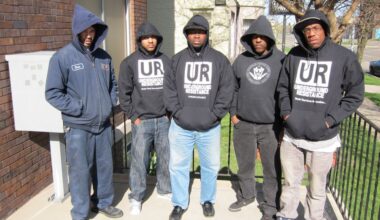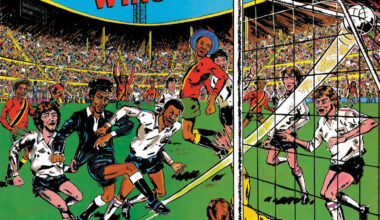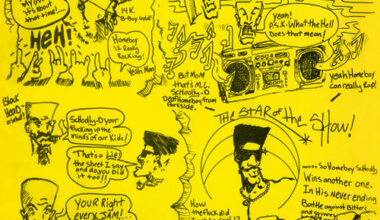Freewheeling through time and space, our renegade columnist ventures out on his further adventures in audio. This month, Ron Hardy…

Where were you when you first heard ‘Acid Tracks’?
It was 1987 and I was working at Bleecker Bob’s record shop in New York’s West Village. At lunchtimes, I’d scoot up Third Street, cross Sixth Avenue and snarf the latest house 12-inches at Vinyl Mania on Carmine Street (as favoured by post-party Paradise Garage revellers). ‘Acid Tracks’ arrived one day and, blasting from the mammoth speakers, blew my tiny mind as something new, alien and utterly compelling; that slurping, chomping squelch motif spitting like a malevolent demon; mad, crushing, morphing and fluttering like ectoplasmic shrapnel. It was acid house’s ‘Anarchy In The UK’.
Excitedly, I paid my $3.99 and scuttled back to Bleecker Bob’s, wrenched the usual Guns N’ Roses off the deck and stuck on ‘Acid Tracks’; unfortunately, coinciding with bullying boss Bleecker Bob arriving like the Queen. “What’s this shit?” he snorted. “Sounds like the drain’s playing up. Put some music on!”
Gripped by this new sound, I tracked down every acid house record I could find in New York City and started a section in the shop. From where I was perched in pre-gentrification downtown New York, although I read the UK music papers every week, acid house was a Chicago-spawned monster sound with a Motor City brother called techno and a cartoon version going on in the UK (obviously, I’d discover the full implications when I came home).
By 1989, I was editing Tommy Boy’s ‘Dance Music Report’ tipsheet and meeting house music’s prime movers, including DJ Pierre, who handed all credit for ‘Acid Tracks’ and the furore it sparked to Ron Hardy, DJ at Chicago’s Music Box club who single-handedly broke the tune. No Ron Hardy, no acid house. This was confirmed by Derrick May when we met in 1990, and again just after Hardy’s March 1992 death.
Yet, outside of his immediate circles, few knew about Ron Hardy. He didn’t get credited when acid house broke in Britain in 1988 and when he did, he’d already succumbed to heroin then AIDS. This man put Larry Levan in the shade. It took Bill Brewster’s piece in the Faith fanzine in 1994, and then his ‘Last Night A DJ Saved My Life’ book, written along with Frank Broughton, to tell the world about this blinding embodiment of acid house’s wild, pioneering spirit.
Coming up at Chicago’s Den One in the mid 70s, where he experimented with twin decks and reel-to-reels, Hardy tried his luck in California between 1977-82 before returning to a city in thrall to Frankie Knuckles reinventing disco’s future at the Warehouse. Hardy took over Frankie’s old space and made it his own as the Music Box, playing accelerated disco and electronic pop at chest-rattling volume to berserk disciples, many on acid. The Music Box became his church when it relocated to a black-painted, strobe-lit underground cave beneath a downtown car park complex, driving his crowds to rapturous frenzy with his blistering, cathartic onslaughts. Soon, budding producers like Marshall Jefferson, Larry Heard and of course Phuture were bringing him their new creations, made especially for the Music Box.
One evening in April 1992, I sat enthralled in a Little Venice restaurant as Derrick May remembered the DJ who changed his life, shaking with the memories and crying with emotion.
“He touched a lot of people, man. He was a spiritual leader. He was the best. I know for a fact he influenced me to play the way I play, and I’ve been told that before by many people. If I had to mimic one person in the world, I’d want it to be him; his candour, the way he held himself. He wouldn’t leave Chicago because he had a certain equipment set-up at the Music Box. He was a class act, man.
“Ronnie was a maniac. You talk about plus eight; this guy would play records at plus 12 if he had it. He played versions of things that weren’t meant to be played, loop ’em on a drum track, with some of the tracks going backwards, then he’d run some crazy shit on top of it on reel-to-reel and play that shit as fast as he could. He was the Salvador Dali of the turntables. DJ Dali!
“I can’t even explain it to you. If I close my eyes I am really fucking there; standing against the wall, watching these strobe lights, these black kids, brothers and sisters got their shirts off, reaching for the sky and the stars.
“It was like the most disgusting hole in the wall club you’ve ever seen in your life! It was underneath the downtown parking structure in Chicago. It was just a fucking hole in the wall, man. The kids would give up the little money they had to come in. It was 50-50 gay and straight. The gay kids had their drugs, most of the straight kids got off on their marijuana. They shared whatever they had. Most kids got high off the music. That was it.
“I know for a fact if I’d never heard Ron Hardy I’d never have made one record. I know it. He opened my eyes to everything and made me see. He didn’t have to even speak to me. It was like I was supposed to hear him play, like I was led by the hand. We’d drive from Detroit all the way to Chicago just to hear him play every week. I would stand there and go crazy. This would last all night. It was really all him. He’ll always be here [thumps heart], and here [taps head].”
Although recordings have since surfaced, at the time Derrick was trying to get a tribute record together.
“I told Robert Owens I was going to bust my ass trying to get people interested, because nobody knows who he is and when I’ve mentioned his name in interviews, it’s like, ‘Who’s Ron Hardy?’. He’s been completely forgotten. He was forgotten when he was alive! He’s dead now and nobody cares. House music wouldn’t exist if it wasn’t for him and Frankie. Period.”





